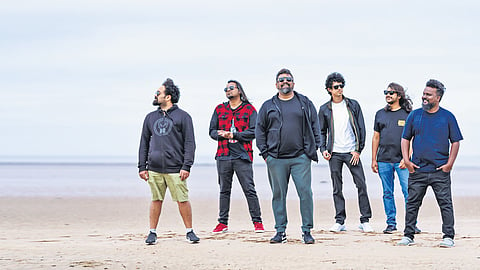Stepping across the worry lines
It’s a chilly evening in Delhi. The night sky looming above central Delhi’s Purana Qila is clear, bathing the ancient monument in suffused, romantic light. A massive banyan tree on its vast grounds, perhaps as old as the monument, provides shelter to a throng of people, who are swaying and dancing with abandon. Their inspiration: lungi-clad members of the Bengaluru-based Raghu Dixit Project, belting out lively foot-tapping beats at the ASEAN India Music Festival 2024.
“When the whole world is fighting wars, we are celebrating each other in India,” declares band headliner Raghu Dixit after completing his set. “It’s a great way to honour other cultures and build human connections. Music is a universal language. It makes you realise that we are not very different from each other, so there’s no point in these divisions between countries or communities,” he adds.
As a charismatic performer, Dixit’s vibe has certainly attracted a large tribe of musical loyalists. Over two decades, he has performed across India and abroad, masterfully blending his classical training with rock. Primarily singing in Kannada and presenting age-old songs written by ancient poets in new avatars, Dixit is equally at ease with the Carnatic classical violin and the electric guitar.
His tuneful career began in 2010, when he was launched by music composer duo Vishal-Shekhar on their new music label, through a self-titled album which made a splash both in India and abroad. It was while touring in Britian to promote the album that he met a number of musicians with whom he would later collaborate to form the Raghu Dixit Project.
His bandmates Joe Jacob (drums and percussion), Naresh Nathan (bass), Akshay Ganesh (violin), Goutham Hebbar (flute), Sanjay Kumar (guitars) and Paul Anthony (sound), joined the band at different periods of time. Like many Indie musicians, some of them multitask as music educators, corporate professionals and independent artistes. However, under the Raghu Dixit Project banner, they are united in championing original music in vernacular languages.
Together, the band has created a unique, upbeat tone which highlights the vast variety this India has to offer. The performance gear they wear on stage—lungis, ghungroos and chunky traditional jewellery—makes the point. Dixit explains, “With all the languages, dialects, types of food and lifestyles extant in India, we have so much to be inspired by. We believe this tremendous variety and liveliness is best captured in vernacular tongues… it adds to the mystery.”
Their songs have strong, engaging narratives which reflect their experiences and emotions. This is most evident in their latest album Shakkar. Dixit wrote all eight songs while going through a particularly rough phase. He recalls with candour, “I was depressed and suicidal. Every night I would go to bed hoping I won’t wake up the next morning and would wake up every morning cursing the fact that I was still breathing.” Interestingly, this low phase led to him producing some of his most positive songs. “I want them to resonate with everybody. I want them to know that they too can be incredibly strong and achieve anything so long as they don’t give up on themselves.”
Shakkarpari, literally translating to ‘sugar fairy’, is the album’s title song in Hindi, and was one of the most popular numbers performed at the ASEAN concert. The sweetness is a metaphor for the happiness that Dixit hopes to spread among his listeners. Also playing on this sentiment is another popular, albeit older, number by the band—Lokada Kalaji—an 18th century folk song in Kannada by the saint poet and reformer, Shishunala Sharief. Dixit explains its meaning: “The poet says: you want to worry about the whole world, and I am not one to stop you, please feel free to worry. But know, that worrying by itself doesn’t help anything.” It becomes clear that Dixit’s music with its raw and infectious energy certainly embodies the Bobby McFerrin spirit, ‘Don’t worry, be happy’.

